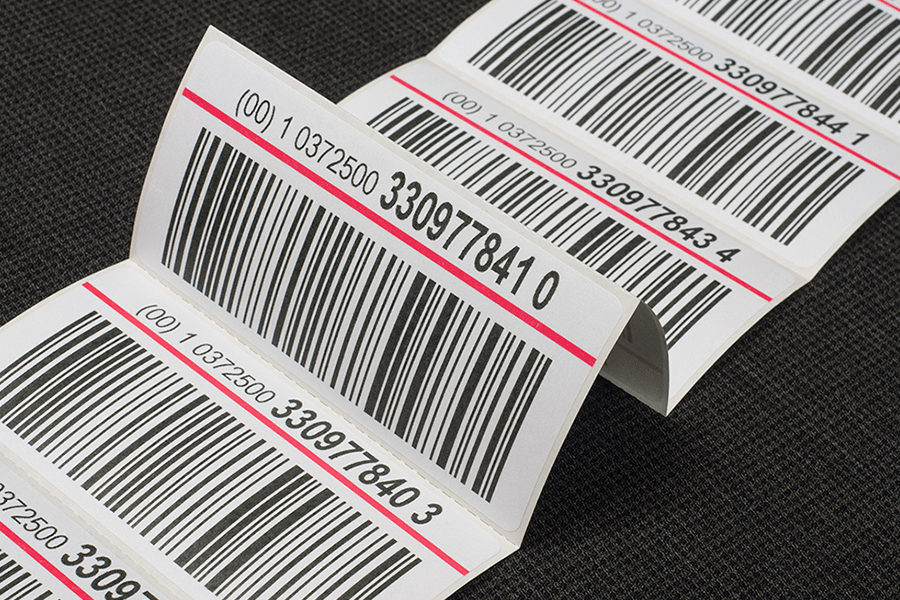Barcode labels help businesses easily track stock and accessibility key product information. In one scan, you are able to see product information, stock on hand, pricing, and even complete a sale. However, not all of barcode labels are the same. Below we cover 2 barcodes labels that most companies use and show you 3 ways to make and print them.
Before we dive in, most companies streamline barcode scanning and printing by using a system that’s designed to control stock. We recommend using Lightspeed POS for this because it offers you an array of easy-to-use stock management applications, tracks all of your earnings, plus much more, for only $99/month. Best of all, you can try it free for 14 days.
Attempt Lightspeed for Free for 14 days
We are going to begin by taking a quick look at the three things you want to create and print barcode tags, and dig into the details of how to get everything done.
3 Things You Need to Make & Print Barcode Labels
Making barcodes and printing barcodes on labels isn’t difficult, but you really do need 3 important items to make it happen. These are:
- Unique merchandise codes for each product you create or carry — These may be UPC codes which identify manufactured products, unique SKU numbers that you use to monitor stock your manner, or other identifying numbers.
- A system that allows you input codes to create barcodes — Your codes will need to be entered to a device or software system which may translate the numerical or alphanumeric code into a scannable barcode.
- A tag printer and label stock for printing — From laser printers and sheet labels to specialty label printers and label rolls, so you’ve got lots of options .
Now let us have a good look at each of the 3 items you want to make and print barcode labels.
1. Unique Products Codes For The Barcode Labels
Scannable barcodes are predicated on the exceptional product codes that you use to spot and track your merchandise. Most businesses use either UPC numbers or SKU amounts for barcode tags. Which is best for you depends on the sort of business you run and your inventory tracking needs. Following is a fast look at both of these choices, and we’ll explore each in detail below.
Two Key Types of Barcodes Employed to Print Barcode Labels
| Type of Barcode | Finest for | Where to get | Price |
|---|---|---|---|
| UPC | Merchandise manufacturers & private label sellers | International Standard 1 (GS1) | $250 for 10 UPC codes & upward |
| SKU or alternative Identifier | Retailers and resellers | Create your own, learn how | Free |
UPC Barcode Numbers
UPC barcode labels are everything you find on many products and are put there by the manufacturer. To get UPC codes, producers enroll with Worldwide Standard 1 (GS1) to receive exceptional 8- to 12-digit codes which identify and track their merchandise worldwide.
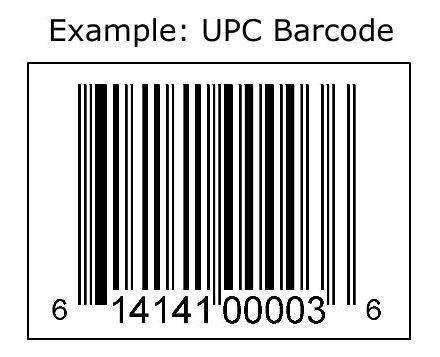
Should you create products or sell private label products under your brand, you need to think about registering with the GS1 and obtaining UPC codes. It’s not required by law to have UPC codes to create and market products, but there are many advantages, including:
- Help protect your brand from brand theft and merchandise forgery
- Allows You to market on Amazon (a legitimate UPC is required for items sold on Amazon)
- Makes it Simple for buyers to get information about your product on the internet, such as product type, limitations, as well as potential allergens (in the case of food items)
- Can be used in retail point-of-sale (POS) systems like Lightspeed to track inventory and speed up checkout
You may find out more about getting started with UPC codes on the GS1.org website.
SKU Numbers
It is also possible to create and print barcode labels based on any inventory tracking or numbering system which you set up for your own operation. Custom SKU numbers, particularly, are popular with retailers and ecommerce companies who take a variety of goods from many suppliers.
Establishing your own custom SKU amounts offers many benefits over trying to monitor products using just manufacturer UPC codes. See the benefits of habit SKU numbers and learn how to set them up for your business within our guide to generating SKU numbers.
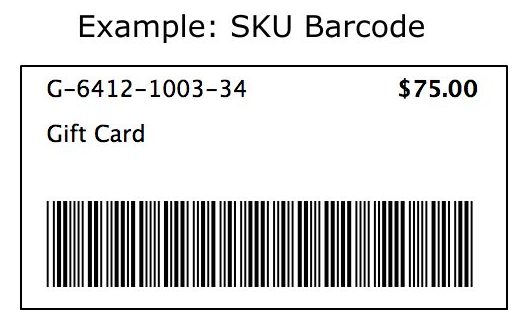
Once you choose a code type and have your distinctive product codes set up, your next step is getting them into a system which translates codes into scannable barcodes for your labels.
2. Turn Product Codes Into Scannable Barcodes
You can turn your product codes to scannable barcodes using a POS system, barcode generator websites, or a mobile barcode printer. Here is how each of these 3 options works to create your barcodes.
A Retail Point of Sale (POS) Inventory Management System
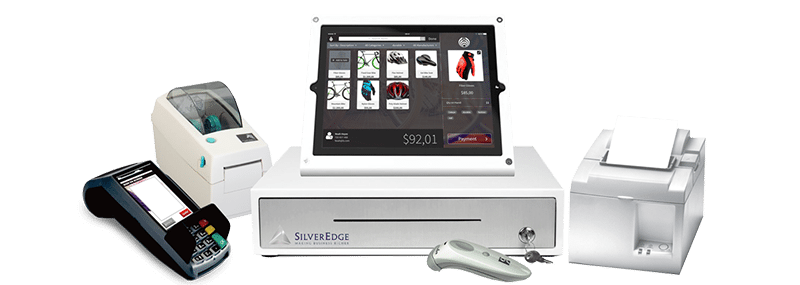
Source: Lightspeed POS
If you already use a Point of Sale System (POS) and/or order management system for your store, then the majority will print barcode labels for you. If not, then you may want to take into account a system with these features. Using one, you can simply print barcode labels out as required. It truly makes the process easy.
From Lightspeed’s Print Product Labels display, shown below, you can pick the type of code you want to publish on your labels. In cases like this, Product Code is selected. But if you would like to publish a UPC code or another code that you track in the system, you can select those, also.
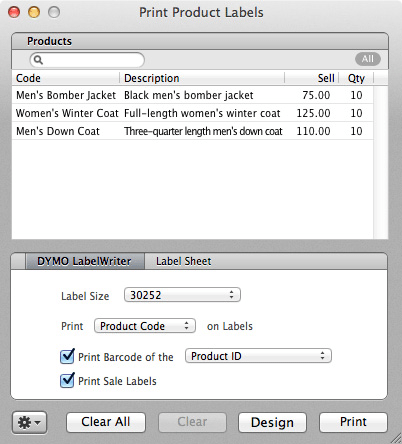
Source: Lightspeed POS
You also have choices for printing different data in your labels, such as the product name and pricing, by selecting Printing Sale Labels, displayed above. You may choose the quantity of each tag to print, too. As soon as you’ve selected all the details, simply click Print.
Barcode Generator Websites & Document Software
There are several websites will translate codes which you enter into a variety of barcode images. Online Labels will also do it at no cost. For example, this is a barcode for my company’s custom SKU amount, BW-066-011:
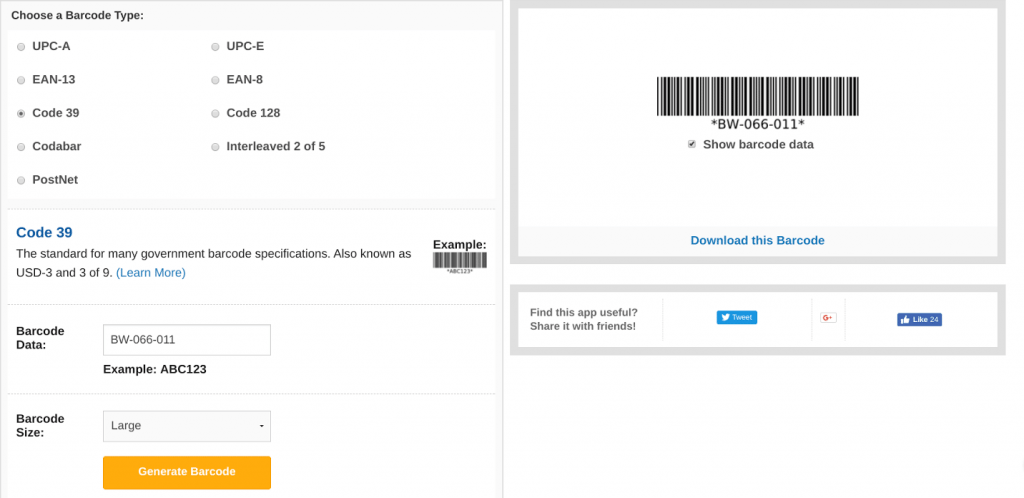
Source: Online Labels
As you can see above, you can select from several barcode formats. Note! These inkjet variations normally work together with all devices and stock systems provided that you pick the identical barcode type on your scanner and network settings.
Free barcode generators are a convenient method to produce barcode images, but you still have to get them printed on labels. You may order printed sheets or rolls of the barcode labels you create on onlinelabels.com and similar websites. But that service includes a price tag, starting at roughly $20 for 100 sheets of labels. For this, you receive 700 of the very same codes, printed on ready-to-use labels, and they arrive in just a few days. This option is popular with manufacturers who need large amounts of labels but do not want to bother with printing tags.
But if you need just a few barcode labels and don’t want to spend any money, you are able to. First, use Online Labels or an identical website to create your barcode, as we mentioned above. From there, you may download your barcode as a. Jpg image and simply insert it into Microsoft Word, Google Docs, or another document creation application. Then print your code on label sheets, which we cover below.
Mobile Barcode Label Maker
If you do not promote a high number of products, or don’t have to track inventory in a retail POS or other inventory management system, a portable handheld barcode maker with an integrated printer may be all you need.
A handheld barcode manufacturer works just like it seems. You type the code and tag information into the apparatus, such as the Brother P-Touch shown below, and it translates your code into a repository. It lets you customize the look of your label and include more information like product name or pricing, then prints your barcode and other information right onto a label.
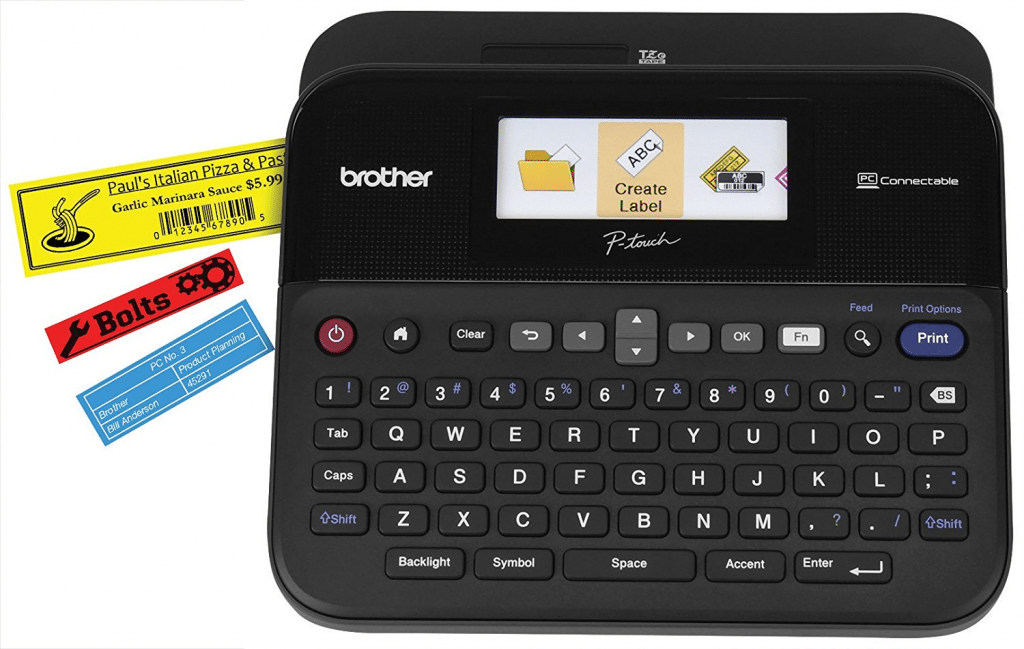
Source: Amazon
Handheld mobile barcode label printers like the one shown above start at about $60. You do need to use label rolls intended for their system, which adds costs depending on the quantities that you need to print. But, you can hardly beat the simplicity and convenience should you need to publish a limited number of tags on the fly.
We have already covered some techniques to publish your barcode labels since some barcode creation methods include printing at the process. Next, we will examine different ways to get your barcodes printed onto a variety of labels and tag stock.
3. Ways to Print Your Barcode Labels
If you’re generating barcode labels with a retail POS, ecommerce management system, or document applications, you’ll have to use a printer and label rolls or sheets to print the labels you create. With the other alternatives discussed above; majority ordering from an internet service or having a handheld printer, the printing is built-in.
For other label printing, there are two main types of printers you can use and each will print a wide array of label shapes and dimensions. With them, you’re able to clearly label your goods, in addition to store, stockroom, or store shelves. Whatever you need to tag, rest assured, there’s a label made for this purpose and also you can your barcode onto it.
Laser & Inkjet Printers with Laser or Inkjet Labels
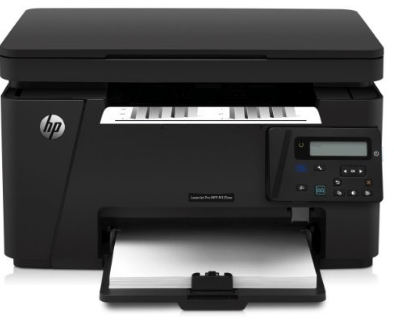
Source: Amazon
You most likely already have a laser or inkjet printer, and if you don’t you can pick one up beginning at roughly $50. With one, you can print a Massive variety of crisp barcode labels in several sizes, like these barcode warehouse bin tags made using Avery laser printer tags:
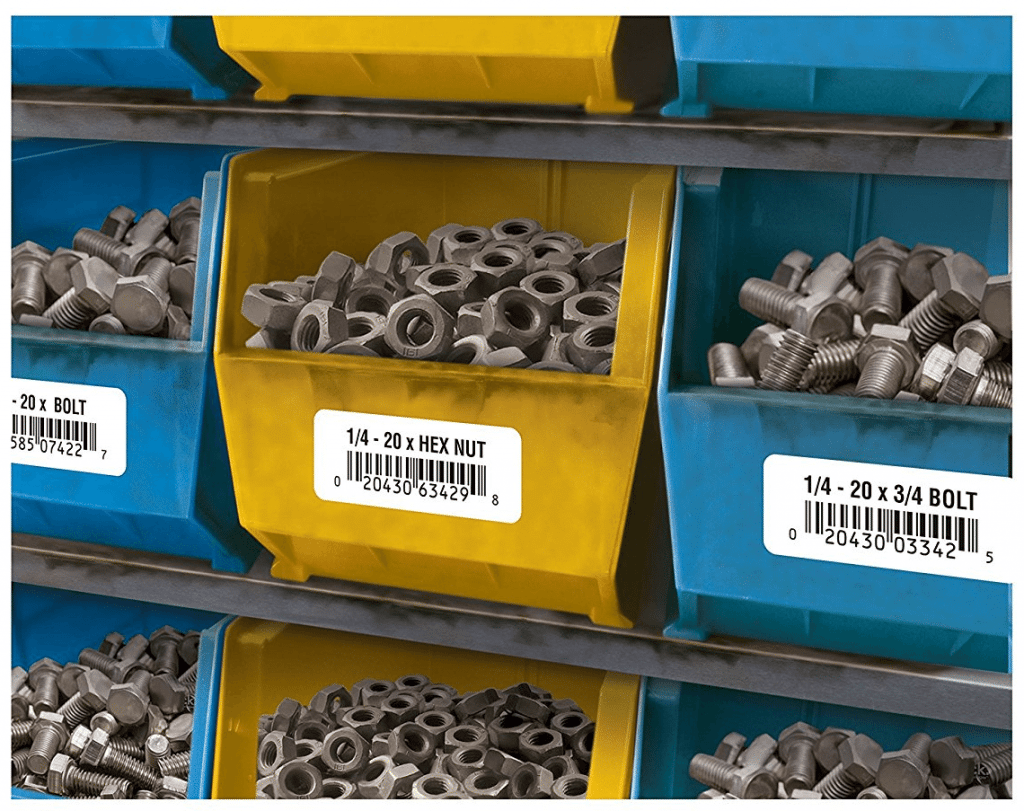
Source: Amazon
Label makers like Avery offer a massive selection of precut laser and inkjet label sheets that integrate with many POS and other inventory management methods, including Lightspeed POS. With them, you can print barcode labels into the exact dimensions and quantity that you need.
Thermal Label Printers & Portable Thermal Printers
Thermal label printers are a terrific option if you need to print barcode labels in large amounts or quite frequently. These print on thermal label rolls and do not require toner or ink, unlike laser and inkjet printers. That means you’ll never be stuck unable to print labels because the printer ran out of ink.
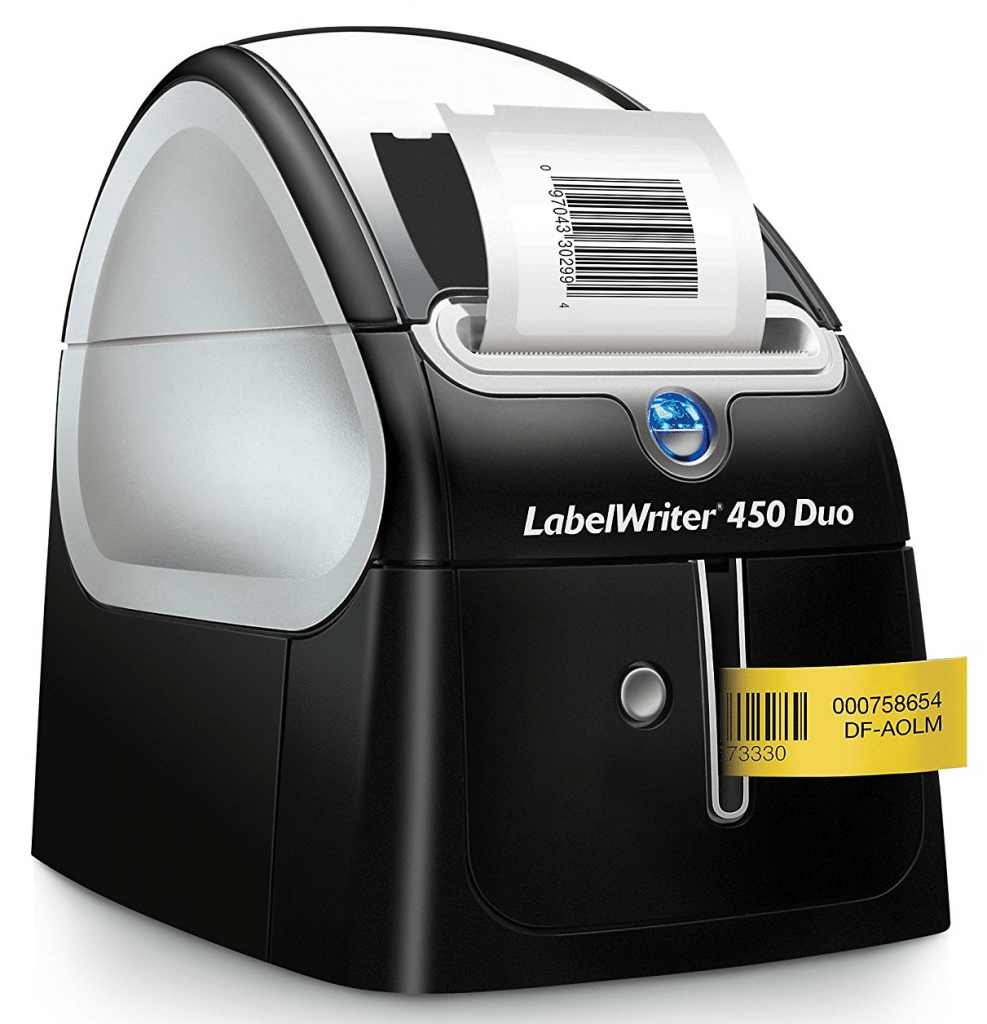
The Dymo Thermal Printer runs about $100 on Amazon.
Dymo, previously, and Zebra, under, are just two leading manufacturers of thermal printers that integrate with POS systems as well as other barcode label printing methods. Zebra even makes portable thermal printers that wirelessly connect to a POS or other stock management system.
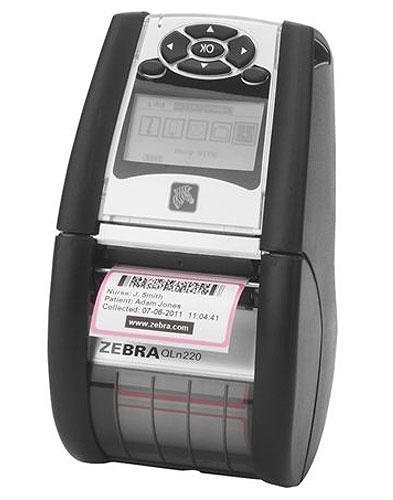
The Zebra Portable Thermal Label Printer runs about $300 on Amazon.
If you operate a large warehouse or retail shop, portable wireless printers are convenient to reprint labels on the ground as-needed. This is beneficial during stock moves, price updates, and shop redesigns.
The Bottom Line
Clearly there are lots of ways to print labels for your products, store shelves, stockroom, or warehouse. If you sell only a couple of products and don’t track inventory in a retail POS or other stock management program, the printing barcode labels on a handheld device or via an online barcode generator might be all you need.
But if you market an assortment of merchandise in-store or online, or are managing a production operation moving products in bulk, a retail POS such as Lightspeed can help you fully incorporate a barcode label system using end-to-end inventory tracking so that you always know where you stock is and the way it’s selling. Plus using a free 14-day trial, then you can try it completely risk-free.
Attempt Lightspeed for Free for 14 days
Can you use barcode labels on your performance? If so, we’d love to hear the way you produce your own barcodes, what types of codes you use, and the way you manage your label printing from the comments below.

